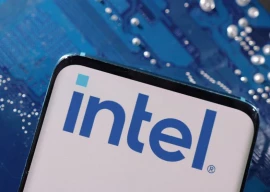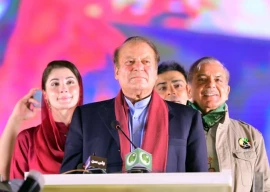
On this forthcoming Eid and its associated purchase of multiple ruminants, why are we so bent on not only ‘keeping up with the Khans’ but also on ‘outdoing the Khans’. We are now in the run-up to Eid with the awfully vulgar displays of rows of prime cattle, goats and sheep herded under a shamiana, outside the sham palaces of the rich, the zillionaires, lined up under a battery of lights kept on at night, depriving them of sleep, so that the proud owners can announce their riches and their total disdain for the awam at large and the millions of ‘have-nots.’
Next week, legs and bits and pieces will be exchanged between the few and deep freezers will be crammed to overflowing when the gluttony is all over. Forgotten will be the 20 million odd flood affectees and the other millions of deprived who have neither herds nor deep freezers.
Now, a most welcome development has come about, but sadly it will not be heeded as the voices raised are too few. Organisations involved with animals (normally treated in the Islamic Republic not as living beings created by God but as some form of inanimate chattels bereft of feeling), a handful of columnists, and even a couple of religious scholars on our TV channels have come up with an admirable suggestion.
Apart from the fact that sense dictates that after the losses incurred the prime breeding stock of the country should be preserved and excesses curbed, it should be realised that a living goat, sheep, cow, or bullock is worth more to the families who have lost their livelihoods than the meat of a dead animal. It has been suggested that those who indulge in multiple unnecessary sacrifices and slaughter donate a live animal, or two, or three, to a village to replace what has been lost and to help the villagers clamber back upon their calloused feet.
If the object of the exercise is to please God, then the use of restraint and common sense and the provision of live animals will surely do so. Goats and cattle provide an ongoing income for families through the sale of milk, ghee and young stock and in addition, supplement their diet and agriculture as a whole, as the animals and their offspring also provide fertiliser.
An organisation called Paws (Pakistan Animal Welfare Society) is running an Eid campaign on the net (pawspakistan.org). A donation of Rs12,000 will buy a healthy, local goat which will be delivered to a flood refugee in Sindh. The cost includes the purchase and delivery of the goat, a veterinary examination and a two-month supply of fodder, which is not easily available in the areas to which flood affectees are returning. The goats will be sourced from locals who sell animals each Bakra Eid so that they do not lose the income upon which they depend.
By donating a live goat or a cow, not only will common sense and compassion be exercised but the animal herder will profit as is usual, a family will receive a long-term gift and the donor will be opting for a ‘life-giving sacrifice’ rather than a slap-up hefty meal and a well-stocked deep freezer. This is worth more than a thought. Heed the Quran : it is not the flesh and blood that reaches God but an individual’s piety.
And please, can the press and the more blood-thirsty amongst the Faithful spare us the photos of camels being tortured to death and the sending around of YouTubes entitled ‘My camel sacrifice’.
Published in The Express Tribune, November 13th, 2010.




























1714024018-0/ModiLara-(1)1714024018-0-270x192.webp)









COMMENTS (13)
Comments are moderated and generally will be posted if they are on-topic and not abusive.
For more information, please see our Comments FAQ